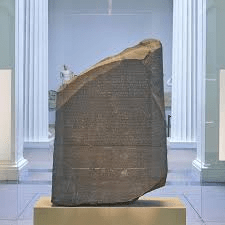Nomadism
The practice of moving from one place to another rather than settling permanently in one location.
Nomad- a person moves from one place to another without settling.
Mr. Tan was quite a nomad before he met his wife in Singapore. He had travelled all over the world but never stayed in a city for more than a year.
Meritocracy
A system in which advancement or status is based on individual ability, talent, or achievement rather than birthright or privilege.
How many alphabets are there in the English language?
1
definition: A set of letters or symbols in a fixed order used to represent the basic sounds of a language.
Irrigation
The supply of water to land or crops to help growth.
Usage: "Irrigation systems allowed ancient societies to thrive in arid regions."
Name this landmark (pyramids is not the right response)

The Great Pyramid of Giza
Free 100 marks
500 marks bonus if correct, if incorrect the team that answers this correctly will get the bonus.
Matriarchy
A system of society where women has more authority than men.
Mandate
An official order or commission to do something.
Oral Tradition
The transmission of cultural knowledge, stories, and history through spoken word rather than writing.
Many of the stories had been passed down via oral tradition. It is likely because of this that there are many variations to the details.
Penicillin
An antibiotic used to treat bacterial infections.
Penicillin was a groundbreaking discovery in medicine, revolutionising the treatment of infections.
What is this artifact

Rosetta Stone
2 tries
3 tries but if no correct answer, the other teams get the point.
Assimilation
the process by which a minority group adopts the customs, values, and behaviors of the dominant culture, often leading to the gradual absorption of the minority group into the mainstream
Bureaucracy
A system of government in which most of the important decisions are made by state officials rather than by elected representatives.
Manuscript
A handwritten document, often used to preserve religious, literary, or historical texts in pre-modern societies.
Astrolabe
An ancient instrument used for solving problems relating to time and the position of the stars.
The astrolabe was crucial for navigation and astronomy, allowing sailors to determine their position at sea.
What is The Code of Hammurabi?
The Code of Hammurabi is one of the oldest and most well-preserved legal codes in history, dating back to around 1754 BCE. It was enacted by Hammurabi, the sixth king of the Babylonian dynasty.
The Code of Hammurabi is a remarkable example of early legal thought and has had a lasting impact on the development of legal systems throughout history.
Helpline: you get the mark if another team gets the answer
Diaspora
The dispersion of any people from their original homeland.
Ongoing assaults in the region had resulted in a diaspora.
Secularism
The principle of separation of the state from religious institutions.
The song was deemed too religious to be played during the state ceremony. It was supposed to be a secular affair.
Code-Switching
The practice of alternating between two or more languages or varieties of language in conversation.
Magnetic Resonance Imaging
A medical imaging technique used to visualise internal structures of the body.
You may give examples to illustrate your point.
The term "Cradle of Civilization" refers to regions where the earliest complex societies and cultures emerged.
These areas are characterized by the development of agriculture, urbanization, writing, and centralized governance.
E.g. Mesopotamia, Ancient Egypt, Indus Valley
Double points
Triple points but -500 if you make a mistake.
Ethnography
Ethnography is a qualitative method for collecting data often used in the social and behavioral sciences. Data are collected through observations and interviews, which are then used to draw conclusions about how societies and individuals function.
Sedition
Conduct or speech inciting people to rebel against the authority of a state.
Lingua Franca
A language that is adopted as a common language between speakers whose native languages are different.
Archimedes' Screw
A machine used for transferring water from a low-lying body of water into irrigation ditches.
Describe The Majapahit Empire
a powerful maritime empire based in Southeast Asia, specifically in present-day Indonesia, from the late 13th to the early 16th century. It was known for its extensive trade networks, cultural achievements, and military prowess. The empire reached its peak under the rule of King Hayam Wuruk and his prime minister, Gajah Mada, who expanded its territory across much of the Indonesian archipelago and parts of Southeast Asia. Majapahit played a significant role in the spread of Hindu-Buddhist culture and influenced the region's history and development.
Catch up if you get the answer correct (same score as the team closest to you.
Catch up to the top score but if you make a mistake, you drop 500 points (and drop to the last place whichever is lower)